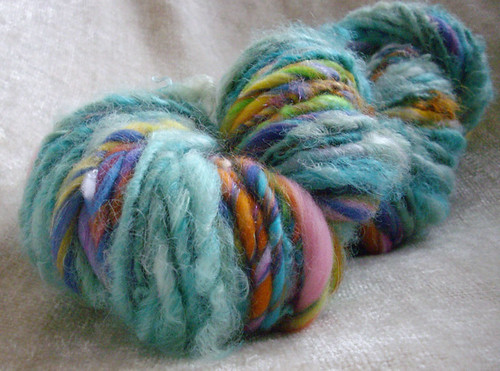Although all BCB yarn is eco-friendly, my first priority is always to find the most local fiber. Yesterday I shared my reasons for eating locally, today we'll talk about what that means for yarn.
After being committed to eco-friendly yarns for two years, it wasn't until reading Animal, Vegetable, Miracle that I even considered finding local yarn. Sure, I loved meeting the animals and farms at fiber festivals, but it hadn't occurred to me that there might be farmers nearby.
When I decided to find local farms, I figured:
a. there wouldn't be anyI was wrong on both counts!
b. the ones I found would be happy to sell me yarn, especially since I need to buy it in bulk (to dye for the Boutique)
There are quiet a few lovely local farms, which I found through a combination of searching and serendipity. But the farmers I found are just that: farmers. Most aren't fiber artists or spinners or knitters! So even though they loved their fiber animals, most farmers aren't stocked with the actual fiber products (roving, yarn, etc).
In fact, most sheep farmers (that I've met) send their fleeces to the Wool Pool. The Wool Pool is mysterious, semi-governmental thing in some states. You can read about Tennessee's here. I learned that some wool distributors (like R.H. Lindsay) also hold them. The premise is that a processor collects wool from a bunch of different farms and pays the farmers a flat fee per pound. That fee is usually no more than 20 or 30 cents per pound. Compare that to the $30 (or often much more!) per pound that spinners pay for commercially processed roving and you can see that the farmer is NOT getting much of the profit of this product.
Supporting the farmer's in my community is one reason to buy local, but just as important to me is the connection to the fiber and to the animal. Those wool pools through Merino in with Icelandic; even the single-type wools are a mishmash of excellent and sub par fleeces. Instead of highlighting the remarkable, the wool pool reduces all to mediocricy. Buying the fleece right from the farmer and washing it myself, that allows me even more control and freedom! I'm not the only fleece-loving geek, Fuzzy Galore wrote an excellent article on why you should process your own fleece.
So what do I do?
- Continue to look for local shepherds. Sure, I have my favorite farms, but if I'm going to provide you with ONLY small-farm fiber, I need to find a lot more of them!
- Build a relationship with the farmer's I've met - by doing free spinning demos at their farm, referring my friends there and just keeping them up-to-date on the fiber products I'd like to purchase. I also meet up with them at local fiber festivals, provide feedback on projects their working on (processing their fiber into yarn, etc) and hook them up with other local fiber-people.
- Buy what they have. Whether it's a fleece or roving or yarn I might not have otherwise picked, showing my support by actually buying what they offer is incredibly important.
- Learning how to process the fleece into yarn (or find small local mills - which I'm still working on!). Before I started meeting local farmers, I never even considered spending my fiber-time on washing and carding a fleece. But once I saw that the only way to go local was to learn to rely on myself - it seemed obvious. And it ended up being fun and teaching me so much more about fiber, in all it's stages between farm and yarn!
Looking for local fiber?
Of course, you can always check out the Boutique, full of wooly goodness that is local (to me). If you live in the area, I'd be happy to deliver the fiber to you or take you to the farms!
If you want to find fiber close to you, I suggest you:
- Check Local Harvest (type "wool" into the "Products" box). Call the farms and explain that you're a knitter. Before you visit, I recommend asking IF they sell their fiber and in what form. You might be surprised!
- Go to the nearest Fiber Festival (this is a good list.) Head to the barns and chat with the farmers. Ask where their farm is and if they allow farm visits. A lot of the shepherds I've met don't have business cards, so be prepared with a notepad and pen!
- Ask around. Although most people look at me like I admitted to being a vampire when I talk about spinning, they all somehow know someone who knows someone who has an alpaca. Or at least an angora bunny.
- Call your local 4-H office. Seriously, those kids have every animal imaginable.
Now it's your turn!
Any more tips for people who live in an urban area? Do you work with local fiber?


